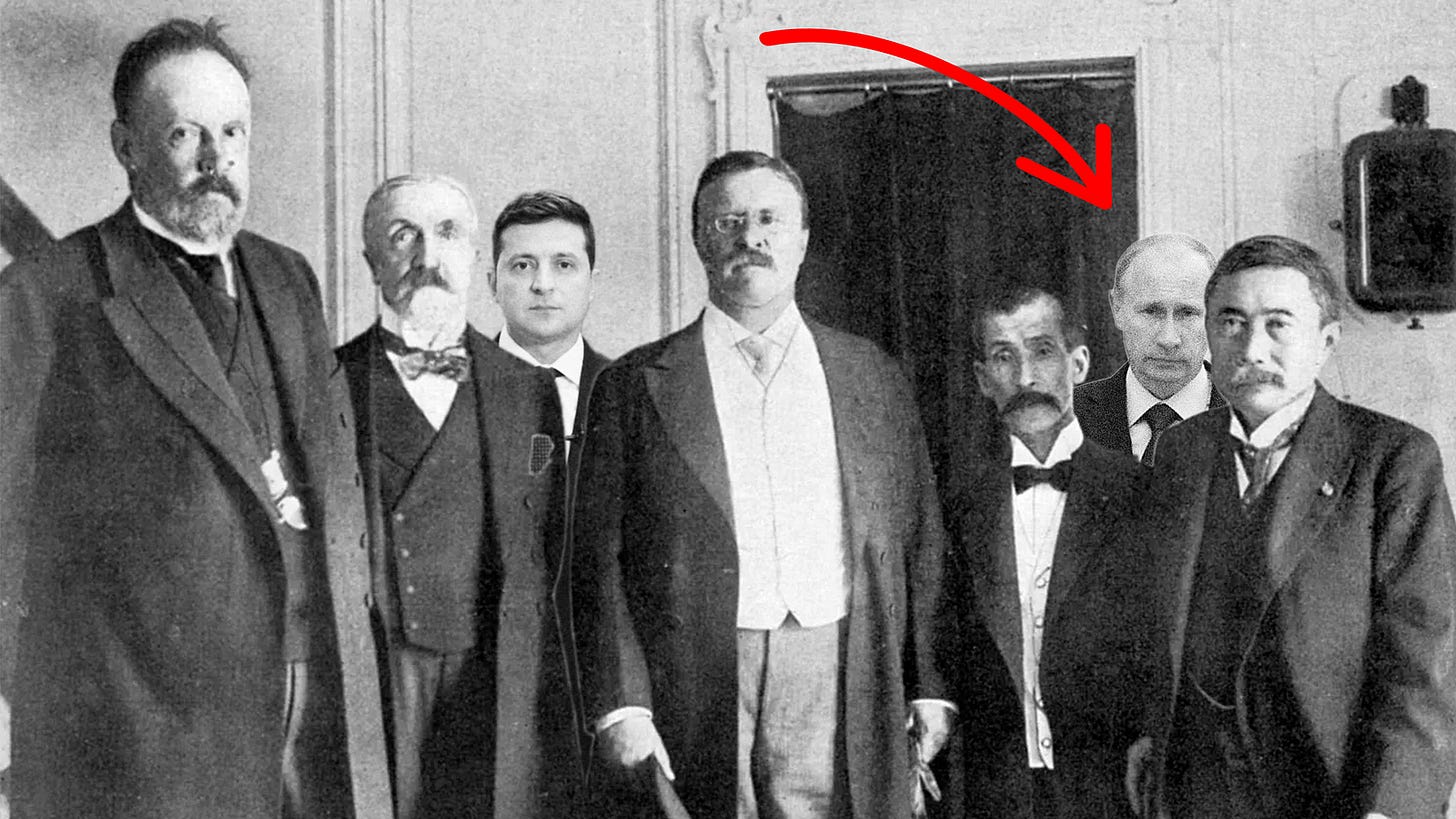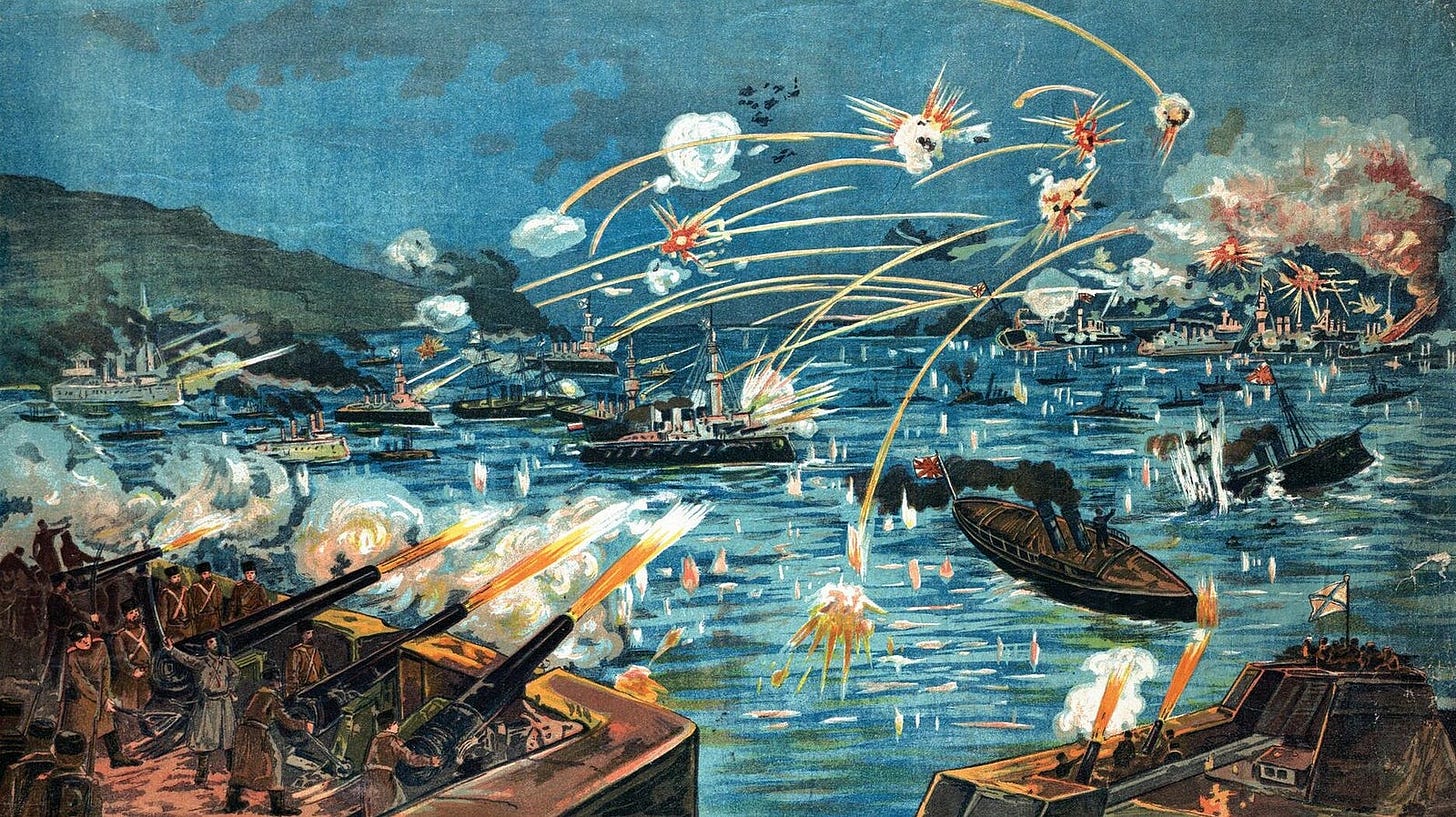How to End the Russo-Ukrainian War Like the Russo-Japanese War
The Russo-Japanese War shares many similarities to the Russo-Ukrainian War, except Imperial Japan behaved more like modern Russia…
Russia expanded further and further East despite assuring Japan they wouldn’t.
Japan increasingly felt threatened by this encroachment so as a last-ditch effort to avoid war they offered a compromise, but Russia declined it, in part, because they thought they could rely on Germany’s support who’d ostensibly offer it on moral grounds, but who really wanted to see them fight each other in order to advance their own geopolitical goals.
Japan sensing the West’s long-term desire to colonize/“civilize” them attacked first.
And then they attacked again.
And again.
And then despite having the upper hand, Japan turned to the US to mediate a deal in the hope of avoiding a war of attrition.
Enter: Theodore Roosevelt.
Speak softly and carry a big stick. — Theodore Roosevelt
In the end, Russia was forced to give up more land than they otherwise could’ve gotten had they accepted the original treaty.
With the peace restored, the man who the press frequently castigated as a warmonger won the Nobel Peace Prize.
I had certainly tried my best to be the friend not only of the Japanese people but of the Russian people, and I believe that what I did was for the best interests of both and of the world at large. — Theodore Roosevelt
But imagine if instead of seeking a peaceful resolution, Theodore Roosevelt gave Russia a blank check in order to buy more American weapons. The war would’ve dragged on much longer!
Imagine if when Japan asked for meditation Theodore Roosevelt responded, “Not until we feel like we’ve sufficiently degraded your military!” Again, the war would’ve dragged on much longer!
Imagine if while at the negotiation table, America and Russia refused to give up a single inch of territory because they didn’t want to be called, “appeasers.”
In each of these scenarios, the war would’ve carried on until much more blood and treasure was sacrificed where no matter how much the US could’ve theoretically given Russia they still wouldn’t have been able to defeat Japan.
During the early part of the year 1905, the strain on the civilized world caused by the Russo-Japanese War became serious. The losses of life and of treasure were frightful. From all the sources of information at hand, I grew most strongly to believe that a further continuation of the struggle would be a very bad thing for Japan, and an even worse thing for Russia. — Theodore Roosevelt
If the war had carried on as long as the Russo-Ukrainian War will likely do (10+ years) then Russia probably would’ve collapsed sooner and Japan may not have entered WW1 on the side of the Russians/Allies, therefore, prolonging WW1 too.
I’d be remiss though to not highlight one key difference between the Russo-Japanese War and the Russo-Ukrainian War, which is that both countries were fighting over foreign land so there was less of a moral dimension in mediating who should rule the locals.
With that said, both colonizers were driven less out of greed than fear.
The best defense was a strong offense.
Russia was correctly afraid of Germany’s rising power so in order to afford a bigger military they had to conquer more land. If they had refused to conquer then it’d only be a matter of time before they’d be conquered.
Japan was correctly afraid of the West too since just about every Asian country fell to Western domination/“liberalization” so to avoid this fate the Japanese upended their culture to modernize their military, but in order to sustain higher taxes — 82% of their national budget went to the military — they had to also get into the colonization game.
In other words, one could argue that each country wasn’t so much fighting over northeast Asia as much as they were fighting over their own national survival with Korea described as “a dagger pointed at the heart of Japan.”
If the Japanese had not armed during the last twenty years, this would indeed be a sorrowful century for Japan. — Theodore Roosevelt
China has neither a fleet nor an efficient army. It is a huge civilized empire, one of the most populous on the globe; and it has been the helpless prey of outsiders because it does not possess the power to fight. Japan stands on a footing of equality with European and American nations because it does possess this power. — Theodore Roosevelt
The same fear manifests itself today, except power is less physical and more economic and social.
The West has been taken aback by Putin’s military aggression because we feel like this isn’t how you’re supposed to play the colonialization game anymore.
You’re supposed to play it by putting your military bases in a host country so that the host becomes evermore dependent upon your military/money whereby you can subtly pressure them overtime to adopt policies that benefit your corporations (who will then apply their own pressure) in the name of “democracy,” “security,” “human rights,” “social justice,” etc.
If you want to strawman the Russian position you can call Putin a sociopath who has brainwashed Russians to support him, but if you want to steelman the Russian position then you’d see that Putin aside many Russians love their country and culture so much that they’re correctly concerned with NATO bases being built on their borders because after all wouldn’t you be concerned if Russia built military bases on our borders?
The Monroe Doctrine lays down the rule that the Western Hemisphere is not hereafter to be treated as subject to settlement and occupation by Old World powers. It is not international law; but it is a cardinal principle of our foreign policy. — Theodore Roosevelt
If we were a more moral country again with low rates of single-parenthood, obesity, depression, addiction, debt, crime, and poverty then it’d make sense we’d want to help the rest of the world get on our level, but we’ve fallen so low that we keep putting some of the most morally depraved individuals into our most powerful positions.
No nation deserves to exist if it permits itself to lose the stern and virile virtues; and this without regard to whether the loss is due to the growth of a heartless and all-absorbing commercialism, to prolonged indulgence in luxury and soft, effortless ease, or to the deification of a warped and twisted sentimentality. — Theodore Roosevelt
Character, in the long run, is the decisive factor in the life of an individual and of nations alike. — Theodore Roosevelt
This isn’t to say Russian culture is superior to American culture, but I do think American culture will become even more vapid the more we “succeed” in spreading it via the barrel of a gun.
This also isn’t to say that America should be isolationist because I believe in implementing some rules to incentivize a better world, such as taxing nations that prohibit free speech (tyranny tariff) or that invade another nation (GTFO Act) or that try to develop WMDs (stopping their proliferation should be our #1 foreign policy focus).
In the end, compromise can be appeasement or it can be appropriate; Neville Chamberlain or Theodore Roosevelt.
Warmongers are quick to remember the former, but rationalists shouldn’t be afraid to weigh all the causes, costs, rewards, and odds in conjunction with our priorities in order to reach some sort of fair-minded conclusion that just may mean “unconditional surrender” or a square deal.










